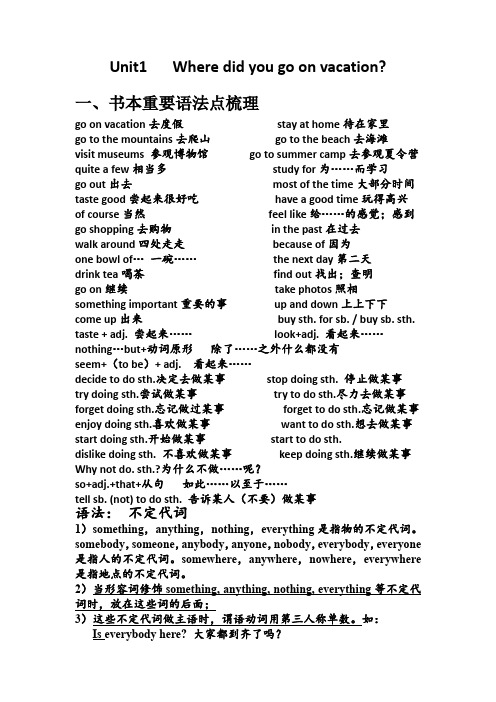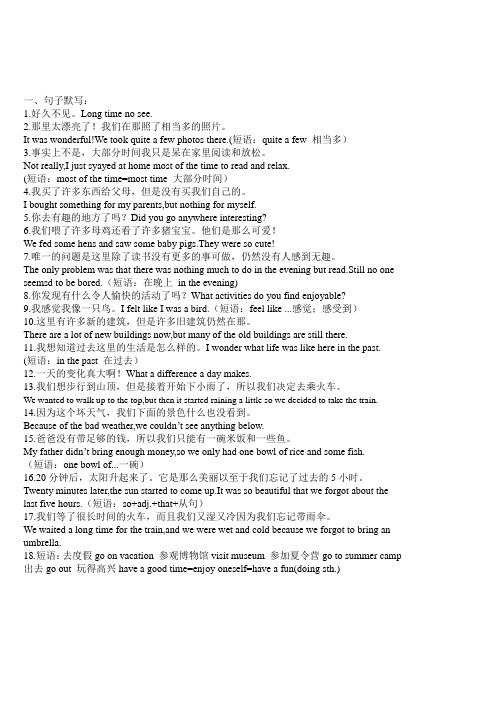人教版八年级上册英语 Unit 1 语法知识点总结
英语人教版八年级上unit1知识点笔记

Un i t 1 Wh e re d id yo u g o on v acation?1•一般过去时考点1:如何判断一般过去时?考点2:肯定句变否定句。
考点3:变一般疑问和特殊疑问句。
2•复合不定代词/副词构成: _________ _________ ___________ _________其中:(no one意思“______ ”指 __ ,与_________ 同义,且与of连用,做主语谓语用单三。
回答引起的特殊疑问句时要用no one.none意思“ ___ ”,指____________ ,且 __ 与of连用。
谓语单,复形式皆可。
回答 _________ 引起的特殊疑问句时要用none;-anyone意思" _____ ”扌旨___ ,与 __ 同义,且_____ 与of连用。
_any one 意思" ____ ”扌旨___ ,与 __ 同义,且_____ 与of 连用。
nothing= _________________用法:① 复合不定代词做主语,谓语动词用 ________ •②当adj.修饰不定代词要_________ •③ 当不定代词中含有some通常用于__________ ;含有any通常用于_______________我自己myself你自己他自己她自己它自己我们自己你们自己他们自己反身代词在句中可用作动词宾语、介词宾语、表语和同位语等,如:She can dress herself.作动词宾语)That?poor?boy?was?myself.(用作表语)Thefatherhimselfhassomething wrong.(同位语:句中常置于名词、代词之后或句子末尾We clean the room ourselves.(同位语:句中常置于名词、代词之后或句子末尾常用短语:穿衣服;?玩得快乐;随便吃;随便用;2.few 意为___________,修饰__________ 名词,倾向于否定。
人教版八年级英语上册第一单元知识点归纳

Unit1 Where did you go on vacation?一、书本重要语法点梳理go on vacation去度假stay at home待在家里go to the mountains去爬山go to the beach去海滩visit museums 参观博物馆go to summer camp去参观夏令营quite a few相当多study for为……而学习go out出去most of the time大部分时间taste good尝起来很好吃have a good time玩得高兴of course当然feel like给……的感觉;感到go shopping去购物in the past在过去walk around四处走走because of因为one bowl of…一碗……the next day第二天drink tea喝茶find out找出;查明go on继续take photos照相something important重要的事up and down上上下下come up出来buy sth. for sb. / buy sb. sth. taste + adj. 尝起来……look+adj. 看起来……nothing…but+动词原形除了……之外什么都没有seem+(to be)+ adj. 看起来……decide to do sth.决定去做某事stop doing sth. 停止做某事try doing sth.尝试做某事try to do sth.尽力去做某事forget doing sth.忘记做过某事forget to do sth.忘记做某事enjoy doing sth.喜欢做某事want to do sth.想去做某事start doing sth.开始做某事start to do sth.dislike doing sth. 不喜欢做某事keep doing sth.继续做某事Why not do. sth.?为什么不做……呢?so+adj.+that+从句如此……以至于……tell sb. (not) to do sth. 告诉某人(不要)做某事语法:不定代词1)something,anything,nothing,everything是指物的不定代词。
人教版八年级英语核心语法考点归纳

人教版八年级英语核心语法考点归纳八年级上册Unit 1考点一:复合不定代词复合不定代词由some, any, no, every 与one, body, thing 构成。
在使用复合不定代词时应注意以下几点:1. some- 一般用于肯定句中,any- 一般用于否定句或疑问句中,在表示请求、建议或期望得到肯定回答时,常用some- 构成的复合不定代词;2. 复合不定代词作主语时按单数看待;3. 形容词或else 修饰复合不定代词的时候应后置。
考点二:一般过去时定义:一般过去时表示过去某个时间发生的动作或存在的状态,也可表示过去经常发生的习惯性的动作或行为。
结构:主语+ 动词过去式+ 其他;主语+was / were + 其他。
常用时见壮语:yesterday, two years ago, last week, just now 等。
1.The old man _____ in Shanghai, but he _____ in Haikou now.A.be born; liveB.was born ; liveC.is born; livesD.was born; lives2. —Where were you last Saturday?—I ____ in the Capital Museum.A. amB. will beC. wasD. have been八年级上册Unit 2考点一:拼读副词频度副词表示动作或行为发生的频率。
常见的频度副词及其发生的频率如下表:考点二:how 疑问词组练一练3.()do you usually go to school,Simon? -by bike.A.WhenB.HowC.WhatD.Where(答案在文末获取)八年级上册Unit 3考点一:形容词和副词的比较级形容词和副词的比较能表示两者之间的比较关系,表示A 比B 更……,通常用than 来连接。
初中英语人教版八年级上册重点短语+句型+常用语法汇总(1-5单元)

八年级英语上册重点知识汇总Unit 1 Where did you go on vacation?【本单元的话题】谈论假期活动内容,复习一般过去时。
【本单元的语法】1复习一般过去时;2.学习不定代词和不定副词的用法。
【不定代词和不定副词的用法】(1)左边的some、any、every、no与右边的body、one、thing构成不定代词,some、any、every、no 与右边的疑问副词where构成不定副词;(2)一般情况下以some开头的不定代词和不定副词用于肯定句,以any开头的不定代词和不定副词用于否定句、疑问句;以no开头的不定代词和不定副词表示否定含义(no one为两个单词);(3)不定代词或不定副词和形容词连用时,形容词放在后面。
He has something important to do.他有重要的事情要做。
(肯定句用something,形容词important放后)Did you buy anything special? (一般疑问句用anything,形容词special放后)Did you go anywhere interesting last month?上个月你去令人感兴趣的地方了吗?(一般疑问句用不定副词anywhere,形容词interesting放后)(4)不定代词和不定副词做主语时,后面的动词用单数形式。
Everone is here today.今天每个人都在这里。
【本单元的短语和知识点】1.go on vacation去度假go to the mountains 上山/进山2.stay at home呆在家go to the beach去海滩visit museums 参观博物馆go to summer camp去参观夏令营3.study for tests为考试而学习\备考go out出去4.quite a few相当多,不少(后跟可数名词复数)take photos照相most of the time大部分时间5.buy sth for sb = buy sb sth为某人买某物6.taste good.尝起来很好taste(尝起来)、look(看起来)、sound(听起来)为感官动词,后跟形容词7.have a good\great\fun time过得高兴,玩得愉快(=enjoy oneself)8.go shopping去购物9.nothing…but+动词原形:除了……之外什么都没有He had nothing to do at home but read yesterday.昨天他在家除了读书无事可做。
人教版英语:八年级上册各单元必考知识点汇总

人教版英语:八年级上册各单元必考知识点汇总Unit1 Where did you go on vacation?【重点语法】不定代词:不指名代替任何特定名词或形容词的代词叫做不定代词。
用法注意:1. some和any +可数名/不可数名。
some多用于肯定句,any多用于否定句、疑问句和条件从句。
有些问句中用some,不用any,问话者希望得到对方肯定回答。
2.由some, any, no, every与body, one, thing构成的复合不定代词作主语时,其谓语动词用三单。
3.不定代词若有定语修饰,该定语要置于其后:如:somethinginteresting【重点短语】1. buy XXX为某人买某物2. taste + adj.尝起来……3. nothing...but + V.(真相)除……以外甚么都没有4. seem + (to be) + adj看起来5. XXX抵达某地6. XXX do XXX决定做某事7. try doing sth.测验考试做某事/ try to do sth.极力做某事8. XXX喜欢做某事9. want to do sth.想去做某事10. XXX.入手下手做某事=XXX.11. stop XXX截止做某事辨别:stop to do sth.停下往来来往做某事12.XXX XXX.不喜欢做某事14.so + adj + that +从句如此……以至于……16. tell sb. (not) to do sth.告诉某人(不要)做某事17. keep XXX继续做某事18. forget to do XXX.忘记去做某事XXX忘记做过某事【词语辨析】1.XXX拍照quite a few+名词复数“很多…”2. seem +描绘词看起来…... You seem happy today.XXX.似乎/好像做某事I seem to have a coldIt seems +从句似乎..….It XXX.seem like ...好像,似乎…..It seems like a good idea.XXX小地址(注:若后跟地点副词XXX,介词需省略,如:arrive here;get home)4. XXX感觉像…XXX.想要做某事5. wonder(想知道)+疑问词(who, what, why)引导的从句。
Unit1知识点梳理及语法讲义-2024-2025学年人教版英语八年级上册

八年级上册英语Unit 1知识点与语法精讲精练词汇梳理(一)完成单词梳理:名词:1. hen母鸡 2. pig 猪 3. diary 日记;记事簿4. activity 活动5. paragliding 滑翔伞运动6. bird 鸟7. bicycle 自行车8. building 建筑物;房子9. trader 商人10. difference 差别;差异11. top 顶部;表面12. umbrella 伞;雨伞13. hill 小山;山丘14. duck 鸭动词:1. seem 好像;似乎;看来 2. decide 决定;选定 3. wonder 想知道;琢磨4. wait 等待;等候代词:1. anyone 任何人 2. something 某事;某物 3. nothing 没有什么4. everyone 每人;人人;所有人5. myself 我自己;我本人6. yourself 你自己;您自己7. someone 某人副词:1. anywhere 在任何地方形容词:1. wonderful 精彩的;绝妙的 2. bored 厌倦的;烦闷的3. enjoyable 有乐趣的;令人愉快的4. wet 湿的;潮湿的5. hungry 饥饿的兼类词:1. few (adj/pron)不多;很少 2. most (adj/adv/pron)最多;大多数3. try (n/v)尝试;设法;努力4. below (prep/adv)在……下面5. enough (adj/adv)足够的(地)6. dislike (v/n)不喜爱(的事物)7. as (adv)像……一样(conj)当……时;如同(二) 词汇变形小结:1. wonder (v. 想知道) — wonderful (adj. 精彩的;绝妙的) — wonderfully (adv. 精彩地)2. bore (v. 使……厌烦) — bored (adj.厌倦的)— boring (adj.令人厌倦的)3. diary (n. 日记) — diaries (复数)4. enjoy (v. 喜爱) — enjoyable (adj. 有乐趣的;令人愉快的)5. activity (n. 活动) — activities (复数)6. decide (v. 决定) — decision (n. 决定)7. build (v. 建造) — building (n. 建筑物;房子)8.trade (n/v贸易;买卖) — trader (n. 商人)9. difference (n. 差别;差异) — different (adj. 不同的)10. wait(v. 等候;等待) — waiter (n. 男服务员) — waitress (n. 女服务员)11. like(v. 喜欢)— dislike 反义词(v.不喜欢)【练一练】用所给词的适当形式填空1.–Mom. I plan to wash clothes by ___myself____(I) this summer vacation.- Good girl! Go for it.2.Can you tell me some __differences___(different) between the two pictures?3.The students have quite a few activities (activity) after class. They can sing, dance and play basketball.4.I think it will be a very enjoyable (enjoy) trip for you to travel to Beijing.5.His cousin is a trader (trade), selling fruit and vegetables.6.The TV show is really boring (bore). I don’t want to watch it.7.As a teacher, Mr. Green always tries to make his lessons _enjoyable__(enjoy).8.This film is _wonderful___ (wonder). I like to see it very much.9.I can look after __myself____(my). Don’t worry about me.10.You must look after __yourself____(you) well while I'm away, Tom.(三) 短语攻关:go on vacation去度假stay at home 待在家里go out 出去quite a few 相当多;不少most of the time大部分时间of course当然have a good time=enjoy oneself 玩得高兴feel like 给……的感觉;感觉像take photos 拍照;照相keep a diary 写日记buy sth for sb 买某物给某人decide to do sth 决定做某事something important 重要的事find out 找出;查明in the past 在过去make a difference 产生影响;起作用enjoy doing sth喜欢做某事too many 太多arrive at/in 到达because of 因为;由于wait for 等待;等候start to do /doing sth开始做某事知识点梳理1.We took a few photos there.我们在那里拍了很多照片。
人教版八年级上册英语 Unit 1 词汇和语法基础(解析版)

知识图谱Unit 1 Where did you go on vacation?知识精讲一、必背词汇anyone [‘eniwʌn] pron.任何人anywhere [‘eniweə(r)] adv.任何地方n.任何(一个)地方wonderful [‘wʌndəfl] adj.精彩的;极好的few [fjuː] adj.很少的;n.少量most [məʊst] adj.最多的;大多数的;something [‘sʌmθɪŋ] pron.某事物;nothing(=not…anything) [‘nʌθɪŋ]pron.没有什么n.没有everyone [‘evriwʌn] pron.每人;人人myself [maɪ’self] pron.我自己yourself [jɔː’self] pron.你自己;你亲自hen [hen] n.母鸡;雌禽pig n.猪seem [siːm] vi.似乎;好像bored [bɔːd] adj.无聊的;厌烦的;郁闷的someone [‘sʌmwʌn] pron.某人;有人diary [‘daɪəri] n.日记;日记簿activity [æk’tɪvəti] n.活动;活跃paragliding [‘pærəɡlaɪdɪŋ] n.空中滑翔跳伞feel like(doing sth.)想要bird [bɜːd] n.鸟;禽bicycle [‘baɪsɪkl] n.自行车building [‘bɪldɪŋ] n.建筑物trader [‘treɪdə(r)] n.商人;商船wonder [‘wʌndə(r)] v.惊奇;想知道;怀疑difference [‘dɪfrəns] n.差异;不同top [tɒp] n.顶部;顶wait [weɪt] v.等;等待(wait for)umbrella [ʌm’brelə] n.伞;雨伞wet [wet] adj.湿的;雨天的below [bɪ’ləʊ] prep.低于;在...下面adv.在下面enough [ɪ’nʌf] adj.足够的adv.足够地;充分地hungry(反full) [‘hʌŋɡri] adj.饥饿的;渴望的as [əz] conj.如同;像...一样hill美[hɪl] n. 小山;丘陵;斜坡;山冈duck [dʌk] n.鸭肉;鸭dislike [dɪs’laɪk] v./ n. 不喜欢;厌恶Central Park 中央公园Huangguoshu waterfall 黄果树瀑布Hangkong H.K. 香港Malaysia 马来西亚Georgetown 圭亚那乔治敦港口,美国乔治城大学Weld Quay街(海乾街/码头) 位于马来西亚槟城岛(州),乔治市Penang Hill 马来西亚槟榔山(升旗山)tian’anmen square天安门广场the Palace Museum 故宫博物院二、重点词汇1. wonderful adjective /ˈwʌn.də.fəl/extremely good绝妙的,令人惊叹的,极好的1). He’s a wonderful cook.他是个非常出色的厨师。
人教版初中英语八年级上册Unit1知识点总结

一、句子默写:1.好久不见。
Long time no see.2.那里太漂亮了!我们在那照了相当多的照片。
It was wonderful!We took quite a few photos there.(短语:quite a few 相当多)3.事实上不是,大部分时间我只是呆在家里阅读和放松。
Not really,I just syayed at home most of the time to read and relax.(短语:most of the time=most time 大部分时间)4.我买了许多东西给父母,但是没有买我们自己的。
I bought something for my parents,but nothing for myself.5.你去有趣的地方了吗?Did you go anywhere interesting?6.我们喂了许多母鸡还看了许多猪宝宝。
他们是那么可爱!We fed some hens and saw some baby pigs.They were so cute!7.唯一的问题是这里除了读书没有更多的事可做,仍然没有人感到无趣。
The only problem was that there was nothing much to do in the evening but read.Still no one seemsd to be bored.(短语:在晚上in the evening)8.你发现有什么令人愉快的活动了吗?What activities do you find enjoyable?9.我感觉我像一只鸟。
I felt like I was a bird.(短语:feel like ...感觉;感受到)10.这里有许多新的建筑,但是许多旧建筑仍然在那。
There are a lot of new buildings now,but many of the old buildings are still there.11.我想知道过去这里的生活是怎么样的。
- 1、下载文档前请自行甄别文档内容的完整性,平台不提供额外的编辑、内容补充、找答案等附加服务。
- 2、"仅部分预览"的文档,不可在线预览部分如存在完整性等问题,可反馈申请退款(可完整预览的文档不适用该条件!)。
- 3、如文档侵犯您的权益,请联系客服反馈,我们会尽快为您处理(人工客服工作时间:9:00-18:30)。
人教版八年级上册英语Unit 1 语法知识点总结Unit 1 Where did you go on vacation?语言目标:谈论过去的事情一、短语stay at home待在家里go on vacation去度假go to the mountain去爬山go to the beach去海滩visit museums参观博物馆quite a few相当多go to summer camp去参观夏令营study for为.....而学习go out出去most of the time式部分时间taste good尝起来很好吃of course当然have a good time玩得高兴go shopping去购物feel like给...的感觉;感受到in the past在过去walk around四处走走because of因为one bowl of...一碗...the next day第二天one bag of applestwo bags of apples/ a bag of apples注意:谓语动词由量词单位决定drink tea喝茶find out找出;查明go on doing继续take photos照相up and down上上下下something important重要的事come up出来二、习惯用法buy sth. for sb. / buy sb. sth.为某人买某物taste+adj.尝起来...look+adj.看起来…seem+ (to be) + adj. 看起来....seem是“看起来像,给人印象中是…”,可以是抽象的;而look是直观的、在眼睛视线看到某东西后认为的“看起来像”,是具体的。
nothing... but+动词原形除.....之外什么都没有arrive in+大地点/ arrive at+小地点到达某地decide to do sth. 决定去做某事try doing sth. 尝试做某事try to do sth. 尽力去做某事forget doing sth. 忘记做过某事forget to do sth. 忘记做某事enjoy doing sth. 喜欢做某事want to do sth. 想去做某事start doing sth. 开始做某事stop doing sth. 停止做某事dislike doing sth. 不喜欢做某事keep doing sth. 继续做某事Why not do sth.?为什么不做.....呢?so+adj.+that+从句如此...以至于...tell sb. (not) to do sth. 告诉某人(不要)做某事三、词语辨析1. anywhere与somewhere两者都是不定副词。
anywhere“任何地方”,常用于否定句和疑问句中。
I can't find it anywhere.somewhere“在某处,到某处”,常用于肯定句。
I lost my key somewhere near here.2. seem +形容词,“看起来…”You seem happy today.seem+to do sth.似乎、好像做某事I seem to have a cold.It seems/seemed从句看起来好像..;似乎...It seems that no one believe you.seem like …好像,似乎....It seems like a good idea.3. decide to do sth. 决定做某事They decide to visit the museum.decide +疑问词+动词不定式He can not decide when to leave.4. start doing sth .= start to do开始,可与begin互换。
He started doing his homework.但以下几种情况不能用begin:(1)创办,开办: He started a new bookshop last month.(2)机器开动:I can't start my car.(3)出发,动身: I will start tomorrow morning.5. over(1)介词,多于,超过,在...以上(表示数目、程度) = more than My father is over 40 years old .(2)...之上,与物体垂直且不接触,与under 相反。
The plan is flying over the montains.(3)超过:There are over 60 students in the class.(4)遍及:I want to travel all over the world.6. too many太多,后接可数名词复数。
Mother bought too many eggs yesterday.too much太多,修饰不可数名词,修饰动词作状语。
We have too much work to do.Don't talk too much.much too太…,修饰形容词或副词。
The hat is much too big for me.You' re walking much too fast.分辨三者的口诀:too much, much too用法区别看后头:much后接不可数,too 后修饰形或副。
too many要记住,后面名词必复数。
7. because of介词短语,因为,由于,后接名词、代词或动名词,不能接句子。
He can't take a walk because of the rain.because连词,因为,引导状语从句,表示直接明确的原因或理由。
I don't buy the shirt because it was too expensive.四、交际用语。
1.- Where did you go on vacation? 你去哪里度假了? (一般过去式句子) -I went to the mountains.我去山区了。
(一般过去式句子)2. Long time no see.很久没见了。
3. Everything tasted really good. 一切品尝起来真的很好。
(一般过去式句子)4. I felt like I was a bird.我感觉我成了一只鸟。
(一般过去式句子)s。
What a difference a day makes!多么与众不同的一天!加下划线的单词,均为谓语动词,使用过去式。
五、语法:一般过去时定义:表示过去发生的动作或存在的状态。
过去发生的动作。
如: 他昨晚做作业了。
过去存在的状态。
如:他出生于2000年1月。
语法构成:谓语动词用过去式。
动词的过去式分为规则动词和不规则动词两种:规则动词的过去式:(1)一般情况下在动词原形后直接加-ed,如:wanted;played(2)以不发音的字母e结尾的动词,直接加-d。
如:hoped;lived(3)重读闭音节单词如果末尾只有一个辅音字母,需双写最后一个辅音字母,再加-ed.如:stopped(4)以辅音字母+y结尾的动词变y为i,再加-ed,如:studied;worried (5)以元音字母+y结尾的动词,直接加-ed,如:played;enjoyed规则动词过去式的读音也有规律可循。
请记住,清后[t],元浊[d],[t][d]之后读[id]。
①清辅音后,ed要读[t]。
如:worked,finished②元音或浊辅音后,ed要读[d]。
如:lived,called③[t]或[d]后,ed读[id]。
如:started,needed不规则动词有其自己的变化形式,只能分别记忆。
+(书后最后一页)[语法解析]不定代词:不指名代替任何特定名词或形容词的代词叫做不定代词。
用法注意:1. some和any可数名词/不可数名词。
some 多用于肯定句,any 多用于否定句、疑问句和条件从句。
有些问句中用some,不用any,问话者希望得到对方肯定回答。
2.由some, any, no, every构成的复合不定代词作主语时,其谓语动词用第三人称单数。
3.不定代词若有定语修饰,该定语要置于其后。
如:something interesting六、作文(一)I had a very good time in my last vacation. I went to the park in the morning. I walked around thepark with my dog and watched people fly kites. Then I found several old people fish by the lake ,and it was very interesting. In the afternoon, I went shopping with my best friend and I bought a beautiful dress. We went to the cinema later in the evening and enjoyed a very good film, and it was exciting. In a word, it was a really nice vacation.我上次度假玩得非常开心。
我早上去了公园。
在公园,我遛了狗并看了人们放风筝。
然后我发现几个老人在湖边钓鱼,这事情非常有意思。
下午我和我最好的朋友逛街,买了一条漂亮的连衣裙。
晚上的时候我们看了电影并且非常喜欢这场好电影,它真的太刺激了。
总之,这是一个非常开心的假日。
(二)This summer vacation, I went to the east of China with my parents for about nine days .First, Iwent to Shanghai by train .I spent one days to go to visit the World Expo Park and the Shanghai TV Tower. It is not the tallest one, but it is very beautiful. Then, I went to Hangzhou to see the West Lake and drunk “Long Jing Tea”. I also went to Suzhou by plane. There are many parks here. I stayed there for about three days and Hangzhou for two days. The next place to go is Qingdao. Qingdao is a beautiful city. There have golden beach and a sea. The seawater and sky is clean and blue. There are many banana trees and coconut trees. We played on the beach and we all enjoyed the beautiful cities. At last day, we took the plane to back to Tianjin after supper. We had a good time!这个暑假,我和父母去了中国的东部几天。
